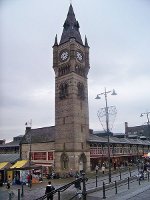Supermarkets are Killing Local Business

Supermarkets succeed for various reasons, but the most important one is that most people prefer to shop in a supermarket rather than trail round the local shops. I like the idea of supporting local business, but supermarkets are more convenient, usually have a better range and thanks to their massive buying power, they're often cheaper.
The solution seems obvious - become a supermarket.
No one market trader or local shop owner could do it alone, of course, but if they got together and pooled their resources perhaps they could rent or buy a town centre location or a big plot of land out of town and make their own supermarket.
So why isn't it happening all the time?
I really don't know. I can think of various reasons, but I'm not sure any of them are correct. It actually does happen to some extent (most of the major retailers started out as market traders or small businesses), but not as much as I might expect. Near me, there's a nice little indoor market. If all of those people got together, they'd have the basis of a proper mass retail business. I suppose an indoor market is already almost a supermarket, but it would be better if it worked more like a proper supermarket, with shopping trolleys and a place to pay at the end, after the shopper had gathered everything they wanted.
That indoor market space could act as the start of a business conveyor belt: The existing businesses move up to being a proper supermarket, and the space gets filled with a new generation of market traders, who eventually save up enough money to go on to make the next supermarket.
So why isn't it working like that? I'm sure there must be a good reason for it, so if any local shop owners or market traders happen to read this, I'd be interested to know.
Certainly there's a lot stacked against them. The high street is dominated by big-name commercial and charity chains, so shop rents have probably risen to meet their deeper pockets, perhaps pricing most small businesses out of the high street. Many councils have been reducing the number of car parking spaces and/or charging more for parking, driving more sales to the supermarkets. An unfortunate and completely unforeseen consequence of 'green' policies and inner city pedestrianisation, no doubt.
What's the way out? Internet commerce offers one solution. The current decline of the highstreet might offer another - how many highstreet shops have to be boarded up before commercial rents start falling to more affordable levels? Is it even desirable to be on the highstreet anymore? Land in areas of low population density is generally cheaper, and yet also better-suited to capturing the custom of the (usually) more affluent, car-owning class of shopper.
Image credit: Michael Taylor.
Edited 18.1.14: Typo.


